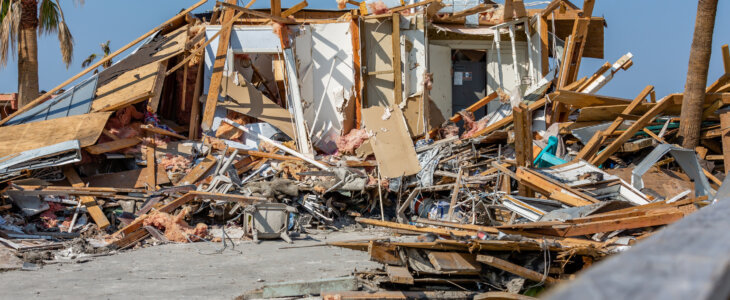Florida’s beautiful coastline and attractive vacation spots make it a prime location for rental properties and vacation homes. However, the state’s susceptibility to hurricanes poses a significant risk to property owners. When a hurricane strikes, the impact on these rental properties can be devastating, affecting both the owner’s physical structure and financial stability. Understanding the legal implications and necessary steps to address hurricane damage in Coral Springs is crucial for protecting your investment and ensuring a smooth recovery process.
In this blog, Tomlinson Law Group will explore the legal advice you need to navigate the aftermath of a hurricane. We’ll cover everything from insurance coverage to handling repairs so you can make informed decisions and safeguard your property’s future.
Understanding the Impact of Hurricanes on Rental Properties
Hurricanes can cause extensive damage to rental properties, impacting both the structure and functionality. Common types of damage include:
- Structural Damage: Broken windows, roof damage, and compromised foundations.
- Water Damage: Flooding and leaks that can lead to mold and decay.
- Wind Damage: Uprooted trees, damaged siding, and broken fences.
The consequences of such damage can extend beyond immediate repair needs. Property owners may face:
- Loss of Rental Income: Properties may be uninhabitable for a period, affecting revenue.
- Decreased Property Value: Significant damage can lower the property’s market value.
- Increased Maintenance Costs: Ongoing repairs and improvements may be necessary to restore and maintain the property.
Insurance Coverage for Hurricane Damage
Understanding your insurance coverage is crucial when dealing with hurricane damage. Here’s what to consider:
Types of Insurance Policies
- Homeowners Insurance: Typically covers a range of damages but may have limitations or exclusions for hurricane damage.
- Hurricane and Windstorm Insurance: Specifically designed to cover damage caused by hurricanes and high winds.
- Flood Insurance: A separate policy is often needed to cover flood damage, which is not usually included in standard homeowners policies.
Common Exclusions and Limitations
- Deductibles: High deductibles can significantly impact out-of-pocket costs.
- Coverage Limits: Policies may have caps on the amount paid out for certain types of damage.
- Exclusions: Some policies exclude damages from specific events or conditions, so reading the fine print is important.
Ensuring you have the right type of coverage and understanding your policy’s details can help you manage and mitigate the financial impact of hurricane damage on your rental property.
Steps to Take Immediately After a Hurricane
After a hurricane, taking the proper steps quickly can make a significant difference in managing damage and preparing for repairs. Here’s what you should do:
Ensure Safety
- Check for Hazards: Before entering the property, make sure it is safe. Look out for structural damage, gas leaks, and electrical hazards.
- Evacuate if Necessary: If the property is unsafe, prioritize your safety and the safety of any tenants or visitors.
Document the Damage
- Photographs and Videos: Take clear photos and videos of all visible damage from multiple angles. This documentation is essential for insurance claims and repair estimates.
- Inventory Lists: Create a detailed list of damaged or destroyed personal property and furnishings.
Contact Your Insurance Company
- File a Claim: Notify your insurer to start the claims process as soon as possible. Provide them with all necessary documentation and details.
- Keep Records: Keep records of all communication with your insurance company, including dates, times, and representatives’ names.
Legal Considerations and Responsibilities
Navigating the legal aspects of hurricane damage involves understanding your responsibilities and ensuring compliance with applicable laws. Here’s what to keep in mind:
Review Lease Agreements
- Damage Clauses: Check lease agreements for clauses related to property damage, repairs, and tenant rights.
- Tenant Notification: Inform tenants about the damage and any changes to their rental situation, including potential temporary relocations.
Landlord Obligations
- Repair Timelines: Follow any legal requirements regarding the timeframe for making repairs.
- Insurance Coverage: Ensure that your insurance policies cover liabilities and responsibilities related to tenant safety and property maintenance.
Handling Insurance Claims and Disputes
Dealing with insurance claims can be challenging, especially if disputes arise. Here’s how to navigate the process:
- Submit Complete Documentation: Ensure all required documentation, including damage reports and repair estimates, is submitted accurately and promptly.
- Communicate Regularly: Stay in touch with your insurance adjuster to track the progress of your claim and address any issues that arise.
If Your Claim is Denied or Underpaid
- Review Your Policy: Understand the reasons for the denial or underpayment and review your policy to ensure it covers the claimed damage.
- Appeal the Decision: Follow the insurer’s appeals process to challenge the denial or request additional funds. Provide any further evidence or documentation as needed.
Role of Public Adjusters and Legal Representation
- Public Adjusters: Consider hiring a public adjuster to help manage the claims process and negotiate with the insurance company on your behalf.
- Legal Assistance: Consult with an attorney who has experience in insurance claims or property damage disputes if you encounter significant challenges or legal issues.
Final Considerations: Protecting Your Rental Property After a Hurricane
Navigating the aftermath of a hurricane can be overwhelming, especially for owners of vacation homes and rental properties. Understanding your insurance coverage, handling damage claims effectively, and ensuring compliance with legal obligations are important steps in managing the impact of such natural disasters. By taking proactive measures, from documenting damage to addressing tenant concerns, you can mitigate hurricane damage’s financial and operational challenges.
If you need personalized advice or assistance with legal matters related to hurricane damage, Tomlinson Law Group is here to help. Contact us today to get the support you need to protect your investment and ensure a smooth recovery process.


